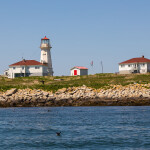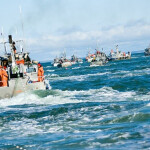The U.S. state of South Carolina has filed a complaint against the federal government claiming the U.S Fish and Wildlife Service (FWS) does not have the right to limit fishing access to the Cape Romain National Wildlife Refuge – an area used for harvesting horseshoe crabs as part of a lucrative blood-draw business.
The refuge, which covers 66,306 acres of land including islands, salt marsh, and waterways, was established in 1932 as a migratory bird refuge. Included among the refuge is 31,000 acres of land that the state of South Carolina leased to the FWS in 1991, with the terms of the lease extending for 99 years.
In its lawsuit, South Carolina is objecting to the FWS restricting access to sections of the leased land, because per the lease, the state has the right to manage the “taking of shellfish, finfish, and other saltwater species within the refuge boundary.” The state is alleging the U.S. government – including U.S. Secretary of Interior Deb Haaland, U.S. Fish and Wildlife Service Chief Martha Williams, U.S. Fish and Wildlife Service Southeast Region Acting Director Mike Oetker, National Wildlife Refuge System Chief Cynthia Martinez, Cape Romain National Wildlife Refuge Manager Sarah Dawsey, and their respective departments – is infringing upon the terms of the lease and its rights by limiting access to the refuge for the harvesting of fish and shellfish.
The dispute stems from the FWS closing areas of the refuge to all public entry at specific times. A regulation established by the service prevents all entry to Marsh Island, White Banks, and Sandy Point in the refuge from 15 February through 15 September to protect nesting birds.
“This closed area extends from the low mean water mark to the highest elevation on these islands,” the regulation states.
An additional memorandum from the Regional Chief of the National Wildlife Refuge System of the service, managed under the Department of the Interior, said anyone wishing to conduct commercial activities in the boundaries of the refuge “must apply for a special use permit from the U.S. Fish and Wildlife Service” beginning on 15 August, 2021.
Those restrictions, South Carolina’s lawsuit states, infringe upon its rights to manage the harvesting of shrimp, finfish, and other species in the refuge.
“Under the lease, the State of South Carolina retains the sole authority over the taking or harvesting of shrimp, finfish, and other saltwater species within the Refuge including, but not limited to, commercial taking or harvesting,” the lawsuit states. “The State did not lease any such authority to the Service.”
South Carolina is also alleging that the 10th amendment – which states any powers not granted to the federal government by the constitution belong to the states – also covers its rights to manage its land, meaning it retains authority over whether harvesting can take place in the section of the Cape Romain National Wildlife Refuge that it leases.
The Fish and Wildlife Service memorandum that kicked off the lawsuit specifically references horseshoe crabs as requiring a special use permit. Horseshoe crabs have seen increased harvests in South Carolina due to a lucrative crab blood-draw business, according to a report by NPR.
The blue-colored blood of horseshoe crabs has been known since the 1960s to have biomedical applications, when scientists discovered it would clot when it discovered various bacterial toxins. The discovery resulted in an industry for fishermen, who collected the animals to be bled in labs, with the blood then used in thousands of different medical applications as a means of testing for unwanted bacteria or contamination.
The NPR report found the rate of harvests and the blood-draw industry has been growing, while the management of horseshoe crab harvests remains relatively lax. In South Carolina, harvested crabs are bled of only a portion of their blood – which can be worth as much as USD 60,000 (EUR 54,800) per gallon – and returned to the ocean alive.
Regulations regarding the harvesting and bleeding of crabs vary, and according to the NPR report, fishermen supplying crabs to Charles River Laboratories have repeatedly been caught violating rules and harvesting crabs inside the wildlife refuge. A lawsuit from environmental groups over the South Carolina Department of Natural Resource’s rules allowing horseshoe crabs to be kept in holding pens was allowed to be kept redacted, as well, keeping information about the lucrative industry secret.
Now, South Carolina is pushing for the court to issue a declaratory ruling that the FWS lacks the authority to impose any limits on its ability to allow finfish and shellfish harvesting, and then issue an injunction barring the FWS from enforcing its memorandum calling for special use permits for harvesting.
Photo courtesy of the U.S. Fish and Wildlife Service







